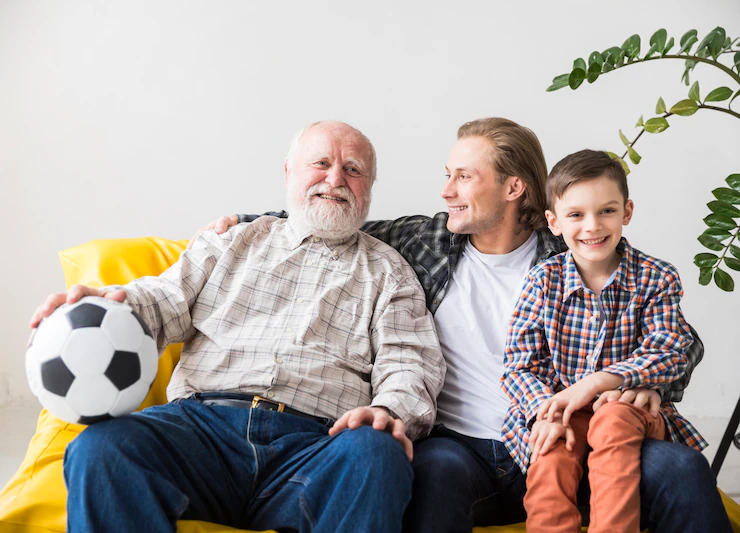Introduction
Fatherhood has undergone a significant evolution over the years, moving away from traditional gender roles and embracing a more diverse and involved approach. Gone are the days when fathers were solely perceived as breadwinners and disciplinarians. Today, fathers are actively participating in caregiving, nurturing emotional connections, and breaking societal stereotypes. In this article, we explore the evolution of fatherhood, highlighting the shift from traditional roles to modern, more engaged and egalitarian approaches.
The Traditional Fatherhood Model
Traditionally, fatherhood was characterized by a clear division of roles within the family. Fathers were expected to be the primary providers, responsible for earning a living and ensuring financial stability. They were often distant figures, with limited involvement in household chores and child-rearing activities. Fathers were primarily associated with discipline, authority, and maintaining a sense of order within the family unit.
The Changing Dynamics
In recent decades, societal attitudes and cultural shifts have brought about a transformation in the perception and expectations of fathers. Several factors have contributed to this evolution:
- Gender Equality Movement: The pursuit of gender equality has challenged traditional gender roles, including those of fathers. Women have entered the workforce in greater numbers, leading to a need for shared responsibilities and a redefinition of family dynamics.
- Increased Awareness of Father’s Importance: Research has highlighted the crucial role fathers play in their children’s lives. Studies consistently demonstrate the positive impact of an involved father on a child’s emotional, cognitive, and social development.
- Evolving Definitions of Masculinity: Society’s understanding of masculinity has expanded to encompass qualities beyond traditional notions of strength and authority. Men are now encouraged to express emotions, be nurturing, and actively engage in caregiving activities.
The Modern Fatherhood Model
Modern fatherhood embraces a more inclusive and involved approach, challenging traditional gender roles and fostering a greater sense of equality within families. Today’s fathers are actively engaged in various aspects of their children’s lives:
- Active Parenting: Modern fathers actively participate in parenting, sharing responsibilities with their partners or taking on the role of primary caregiver. They change diapers, prepare meals, help with homework, and engage in nurturing activities.
- Emotional Support: Fathers now recognize the importance of emotional connection and provide emotional support to their children. They foster open communication, encourage self-expression, and create safe spaces for their children to share their feelings and concerns.
- Work-Life Balance: Modern fathers strive to achieve a healthy work-life balance, valuing quality time spent with their families. They prioritize family activities, attend school events, and make an effort to be physically and emotionally present in their children’s lives.
- Role Modeling Equality: Modern fathers actively model gender equality for their children. They challenge traditional gender stereotypes by participating in household chores, treating their partners as equal partners, and promoting a shared vision of gender roles within the family.
- Supportive Partnerships: Modern fathers strive for supportive partnerships with their co-parents. They engage in effective co-parenting, collaborate on decision-making, and create cohesive parenting strategies that benefit the well-being of their children.
The Benefits of Modern Fatherhood
The evolution of fatherhood towards more involved and egalitarian roles brings numerous benefits:
- Stronger Parent-Child Relationships: The increased involvement of fathers fosters stronger bonds and deeper connections with their children. This emotional closeness promotes positive child development, self-esteem, and overall well-being.
- Enhanced Child Development: The active engagement of fathers in caregiving and child-rearing activities contributes to children’s cognitive, social, and emotional development. They benefit from diverse perspectives and experiences, leading to well-rounded growth.
- Improved Gender Equality: Modern fatherhood models a more equitable distribution of responsibilities between parents. This shift challenges traditional gender norms, promoting equality within families and society as a whole.
- Personal Fulfillment: Fathers who embrace modern roles often experience personal fulfillment and a sense of purpose. They find joy in the active participation and nurturing of their children, leading to increased satisfaction in their roles as fathers and individuals.
Conclusion
The evolution of fatherhood from traditional to modern roles represents a significant societal transformation. Fathers are now recognized as essential contributors to their children’s lives, embracing more involved, nurturing, and egalitarian approaches. By challenging gender stereotypes, actively participating in caregiving, and fostering emotional connections, modern fathers are shaping a new narrative of fatherhood that benefits children, families, and society as a whole. As we continue to evolve, celebrating and supporting the diversity of fatherhood is crucial for creating a more inclusive and equitable future.










